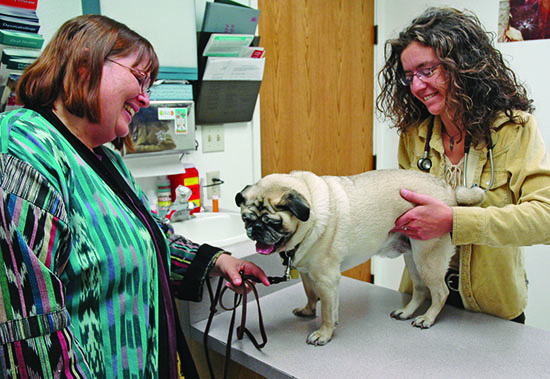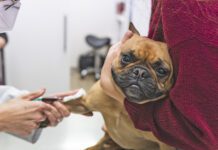How often your dog should be seen by your veterinarian, and what sort of routine screening diagnostics should be conducted, are highly dependent on your dog’s life stage and general health. That said, well-informed owners are in the best position to ensure that their dogs receive the optimum care and attention from their veterinarians.
WHAT’S NORMAL FOR EACH LIFE STAGE VET CHECK UP
For puppies, monthly exams are recommended for vaccinations as well as monitoring the pups’ growth, nutritional status, tooth alignment/development, and general health as the puppy grows and develops. Training and behavioral issues will be addressed as you roll along, and any necessary vaccines given at the appropriate intervals.
Regarding vaccinations, you and your veterinarian should do a personalized risk assessment, based on the lifestyle and environment you share with your dog, before determining which vaccines are right for your dog. Then, follow your veterinarian’s advice regarding boosting frequency and intervals.
During young to middle adulthood (1 to 6 years) annual exams are sufficient for healthy dogs with no medical issues. If your dog suffers from things like allergies, ear infections, gastrointestinal problems, or behavioral/anxiety issues, you will see your veterinarian more frequently, as needed.
The recommendation for healthy senior dogs (7+ years) is to have wellness exams twice a year. Time starts moving a little faster for these guys, bringing with it a higher likelihood of medical problems that may not be outwardly apparent to you, but may be picked up by your veterinarian with physical exam and diagnostics. The earlier an issue is identified, the better the chance of either resolving or successfully managing it. Examples include dental disease, oral tumors, ocular disease, kidney issues, abdominal masses, and anal gland tumors. Having your senior dog examined every six months means catching these things conceivably six months earlier than you would with annual exams.
A THOROUGH PHYSICAL EXAM FOR YOUR DOG
If you’ve ever wondered what your vet is doing while examining your dog, here’s a summary of a typical wellness visit for dogs:
- Body Condition Score (BCS). Vet checks to determine if your dog is underweight, overweight, or at a healthy weight.
- Muscle Condition Score (MCS). This is especially important in senior pets, a measure of general health, strength, and vitality.
- Eye exam (with a light source). Vet checks vision and looks for any infection, inflammation, eyelid abnormalities, dry eye syndrome, or tumors.
- Ear exam (with an otoscope). Vet looks for signs of infection or tumors/polyps.
- Mouth. Vet checks tooth and gum health and hydration status, looks for signs of infection or tumors, and checks color of mucous membranes (pink = normal, pale = anemia, yellow = jaundice, blue/grey = hypoxia/low oxygen level).
- Throat. Vet checks for collapsing trachea.
- Peripheral lymph nodes. Vet palpates these, looking for signs of cancer or infection.
- Skin. The quality of the dog’s coat can indicate problems with nutrition or endocrine disorders; vet also checks for infections, parasites, lumps and bumps, and the dog’s hydration status.
- Abdomen. Vet palpates for signs of discomfort, fluid, organ enlargement, tumors, or bladder pain.
- Rectal exam. Vet looks for signs of tumors, polyps, anal gland impaction/tumor, and checks the prostate in males.
- Genitalia. Vet looks for any abnormal discharge or tumors.
- Heart/pulses. Vet listens to heart for sounds that indicate murmurs or arrhythmia, and checks heart rate, pulse strength, and rhythm.
- Lungs. Vet checks respiratory rate and listens to breath sounds throughout the lungs; do they sound normal or harsh or wheezy, are there quiet areas (indicating fluid or tumor).
- Temperature. Taking the dog’s temperature is not generally necessary to check during a well visit. If you would like it checked, just ask!
As you can see, there is a ton of information to be had about your dog’s health with the physical exam. And don’t worry if we chat with you and ask questions about your dog while we perform our exam. We’ve done it a million times, our systematic exam is deeply ingrained, and we’re multi-taskers by nature.
Be sure and bring a list of any general questions you may have. Time in the exam room goes by quickly, and you don’t want to miss an opportunity to discuss your concerns face to face with your veterinarian.
Your relationship with your veterinarian is a partnership in every sense of the word. In a partnership, two entities come together, working toward and sharing the same goal. In this case, the goal is the health, happiness, and longevity of your dog. A successful partnership, especially in the veterinary setting, requires open, effective communication and mutual trust and respect. This relationship is a big component of your dog’s overall care, so if it doesn’t feel right, it’s well worth the time and effort to find a better fit for you and your dog. You want someone who is patient (with both you and your dog!), who listens and addresses all of your concerns, every time; who understands and respects your goals as well as your limitations; who offers you options (when there are options) and coaches you through the decision-making. The bottom line is, if your vet is someone your respect and trust, following his or her advice with confidence is much easier. It means you can relax and know that you are doing the absolute best that you can for your faithful companion.
DIAGNOSTIC TESTS
It’s a good idea to have a chemistry screen (chem) and complete blood count (CBC) done on your healthy young dog, to serve as a baseline for his future tests. For many dogs, this is accomplished with pre-anesthetic bloodwork at the time of spay/neuter surgery. If your dog is going to remain intact, consider chem and CBC tests at his first annual adult exam. This can be done at the same time as his recommended annual heartworm and tick blood test.
An annual fecal exam for parasites is recommended. This is important because of the zoonotic risk intestinal parasites pose for humans and because of recently emerging intestinal parasite resistance to monthly heartworm/parasite preventatives.
After this, until your dog becomes a senior, how often to repeat wellness chem/CBC screening is really up to you and your vet. It’s good practice to test annually, as information is power. Ask your veterinarian what seems most appropriate for you and your dog. If she tells you it’s not necessary, but you want to do it, just ask. Conversely, if your veterinarian recommends it and you don’t want to do it, ask what risks you may be taking by declining the recommended testing, then make an informed decision for your dog.
If there are medical issues common to your dog’s breed, bring a list of what you’ve found and ask your veterinarian about the clinical relevance and whether there are screening tests that might identify the problem early.
For example, Dobermans are prone to dilated cardiomyopathy, so if you own a Doberman or Doberman-mix, you might ask about an annual NT-proBNP (a blood test that suggests heart enlargement) and an echocardiogram (cardiac ultrasound).
In addition to twice-annual wellness checks for senior dogs, it’s a good idea to employ an increased number of screening diagnostics for them, too. A chem/CBC, urinalysis, and fecal should be considered at least annually. If your senior dog is on a chronic medication, whether it be for pain or anxiety or allergies, checking his blood chemistry twice a year is worth consideration. These are generally the screening diagnostics recommended along with the annual heartworm/tick-borne disease test.
Other diagnostic tests, like thyroid hormone, urine culture, blood pressure check, x-rays, and ultrasound are entertained on a case-by-case basis. Again, if there is a screening test you are interested in, just ask.







I would also add a microchip scan during the checkup to make sure microchip still works. Enjoyed your article and learned from it to better care for my pup.
Great reminder, thanks!
I took my dogs in for their annual a few months ago and the vet listened to their heart and looked in their ears with his eyes, not an otoscope. That was it and he charged $55. This is why people don’t take their dogs to the vet for annual checkups. Since animal medicine has gone the way of human medicine, I have found the quality has decreased dramatically and the prices have increased substantially. It really is a shame. This vet isn’t unique – I hear it all the time from other people.
So $55 is “increased substantially”? From what $25? What would you expect for that? Yet the “quality has decreased dramatically”. If you don’t like it or you think its not up to standard, then find another vet. Simple as that, nothing to complain, make phone calls, find another and move on. If I went to the vet for an annual it would be well over $200. I would never take my dog to a vet that does meet even my own standards, let alone more than once.
Some Vets are now requiring dogs be FULLY vaccinated or they can’t keep them as a patient!! I wish they would use titers more and stop
these redundant vaccines!! There’s even a titer for Rabies available out of Kansas State. PLEASE consider this option!
I would not go to this vet, either. But that doesn’t mean I”m not going to take my dog to the vet. I’m going to take my dog to a vet that does things to my satisfaction, even if I have to pay a little more. Everything is going up–and vet services are (unfortunately) not an exception. If you don’t want to pay for a good exam, you’re not going to get one.
I am of the mind of you get what you pay for.
I pay at least $100 for an annual exam. Fecal and blood test are extra. The vaccinations are an additional expense. All told the annual is about $200.
My vet clinic is not one of those national chains or franchises. It is listed as a “fear free” clinic but that is just a certification. It is privately owned and run by the vets that work there. They spend time with my dogs to familiarize themselves with them, their personalities and for the dogs to get to know them. Each vet has spend some time with them even though are not their primary care vet, just in case in the future they might be treating them.
If you are not happy with the exam and care from the vets where you take your dog, then you should change. But keep in mind if you do, you get what you pay for and you’ll be paying more than $55. If you don’t, you may be shortchanging your dog and they may not be getting the tests, vaccines and care they need to stay healthy.
It is cheaper to prevent a problem than to treat it.
I so agree I recently started talking my 15 year old dog to a new vet and she never looked in her mouth, her ears visually or her rear end. She has dental issues, she has cataracts and is pretty much deaf. The only thing she seemed concerned about were her numbers from her CBC blood work. I left after spending $40 for a case of special kidney diet food she won’t eat and a $350 vet bill!
My 13.5 yr dog was drinking and peeing like crazy a couple of months ago, so I had my vet do a FULL exam including blood tests, X-rays, fecal and urine samples. He turned out to be healthy as can be for a 13.5 yr dog. Shortly after, WDJ had an article that addressed my exact issue. The gist was that if everything else is ruled out to look at it as a potential behavioral issue, which we already suspected after the results came in.
Now that I’m not working so much overtime and getting him out on off-leash outings at the river, gee whiz, my Domino is not drinking like an elephant. My husband and I just laugh and shake our heads at him – $1200 later. Gotta love it. I’m actually glad they did all that testing to find out he’s healthy as a horse other than normal senior progression due to his age.
I’m very grateful for our team of veterinarians who are so thorough, but never run tests without first letting us know the cost and obtaining our permission.
This is all great advice, but there seems to be a veterinarian shortage here, so finding a good match for your dog may not be possible. Our vet just retired and we feel like we are in limbo.
Some Vets are now requiring dogs be FULLY vaccinated or they can’t keep them as a patient!! I wish they would use titers more and stop
these redundant vaccines!! There’s even a titer for Rabies available out of Kansas State. PLEASE consider this option!
I had to chuckle a bit about following the vet’s recommendation as far as vaccines go. Many vets want pets vaccinated for everything under the sun and that would be a no go for me right off the bat. Titers are very useful reducing vaccinations for parvo and distemper but they do cost more. Often clients just opt for the shot. Rabies is governed by state law and our state of Iowa does not accept titers in lieu of a vaccination. Some get an exemption for health reasons from the state.
Many pet owners also do not have a plethora of vets to choose from. They just have to make the best of what’s available. In WY we had one vet in town. The rest were 75+ miles in larger towns. Ok for the occasional special service but not practical otherwise, especially with multiple pets. Always something going on!
I am really worried about my baby she is going to the vet for her rabies and DHLPP and I just saw the thing on the shots? and now I want to NOT get this DHLPP shot for her, as she does not go any where around other dogs, or anywhere except to the vet. I am afraid of taking her any where , like my brother does with his dog and leaves him in the car with the windows rolled down,? I would panic, I have an Afghan Hound and if she see’s me leave the car she cries.! BUT my fear is someone will steal her. Even though she is micro chipped, any how What should I do about the shot am I right about NOT getting it, I took her on her do date, and I try and get her the 3 year so IT was NOT every YEAR, but when you miss it buy one day sorry you missed the date for the 3 year rabies. I really do not want to put her threw more than she needs. I just went threw cancer and she came back to be with me, after my kemo and rad. she was my angel by my side always.
I can’t loose her because of some stupid shot. she DOES NOT NEED
any advice. thanks BJG